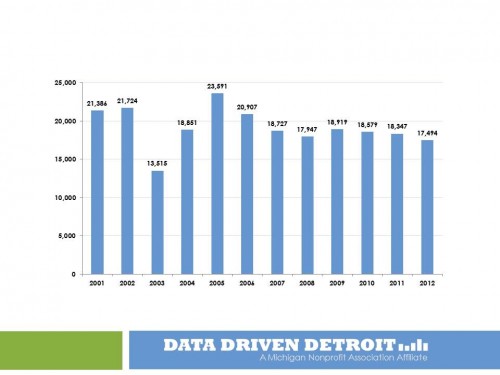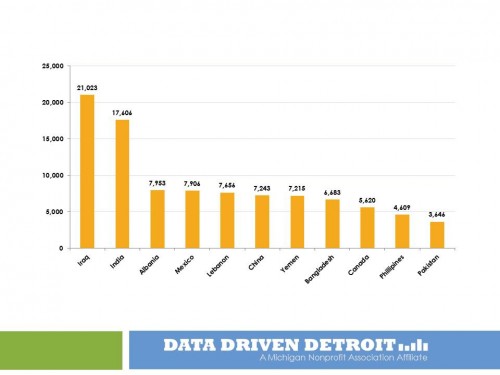Iraqi immigrants flow into Michigan, but state lags in attracting new residents
While the Department of Homeland Security (DHS) has yet to issue their 2012 Yearbook of Immigration Statistics, they have just released 2012 tables on the number of persons obtaining legal permanent resident status (also known as “green card” holders) by state and major metropolitan area.
Immigrant numbers dropped by 2.9 percent nationally, from 1,062,040 in 2011 to 1,031,631 in 2012. This represented the lowest total of arrivals since 2004 when the total was below one million. Michigan experienced a 4.6 percent decrease as 2012’s total dropped to the second lowest of the last twelve years (Figure 1). Among our Midwest neighbors, increases were experienced by Illinois, Indiana, Minnesota and Ohio. Wisconsin was the only one to join Michigan on the losing end with a 3.1 percent decrease.
The trend was similar for the Detroit-Warren-Livonia MSA, the only Michigan metro covered by DHS. Its rate of loss was slightly higher than that of the state, 4.9 percent, though it continued to be identified as the region of residence by about two-thirds of all new Michigan immigrants (Figure 2). In addition, the region followed the state in having the second lowest immigrant total of the last twelve years.
While India had topped all other countries in supplying immigrants to southeast Michigan through 2010, the large flow of refugees from Iraq over the last three years vaulted it into first place by 2011. During fiscal year 2012, Iraqi immigrants increased their lead over India by just over 1,500. Metropolitan Detroit was the destination for 13.6 percent of the nation's Iraqi immigrants and only 1.9 percent of immigrants from India. Bangladesh, which continues to rank 7th over the ten year period, placed a strong third in 2012. The community has coalesced in the Hamtramck area and is becoming a growing presence in local politics. The only change in the rank occurred with China moving past Yemen into 6th place. Metro Detroit's highest shares of national immigration went to Lebanon (18.0%), Yemen (17.7%), Iraq (13.6%) and Albania (12.4%). Syria placed 11th in 2012 as many war refugees came to Macomb County where agencies have been operating since the Iraq war began years ago. Metro Detroit received 6.2 percent of the nation’s Syrian immigrants.
According to the 2011 American Community Survey (ACS), Michigan ranked 28th among states in the percent of its population who is foreign born at 6.1 percent. The 2012 ACS results are scheduled for release on September 19. While our 2012 ranking for total number of new immigrants remained at 14th among the states (our highest ranking was 12th in 2005), we will have to increase our numbers well beyond our recent totals if we want our ranking on foreign born share to move up the charts. The attraction and retention of foreign students continues to be the most obvious avenue to pursue.
Kurt Metzger is director of Data Driven Detroit, a nonprofit in Detroit established by foundations to build greater capacity for people to work together, and improve lives and communities affiliated with the Michigan Nonprofit Association. He was research director for United Way for Southeastern Michigan from 2005 to 2008 and before that, was a director at the Center for Urban Studies at Wayne State University.
See what new members are saying about why they donated to Bridge Michigan:
- “In order for this information to be accurate and unbiased it must be underwritten by its readers, not by special interests.” - Larry S.
- “Not many other media sources report on the topics Bridge does.” - Susan B.
- “Your journalism is outstanding and rare these days.” - Mark S.
If you want to ensure the future of nonpartisan, nonprofit Michigan journalism, please become a member today. You, too, will be asked why you donated and maybe we'll feature your quote next time!


 CLICK TO ENLARGE
CLICK TO ENLARGE CLICK TO ENLARGE
CLICK TO ENLARGE CLICK TO ENLARGE
CLICK TO ENLARGE